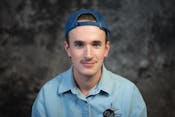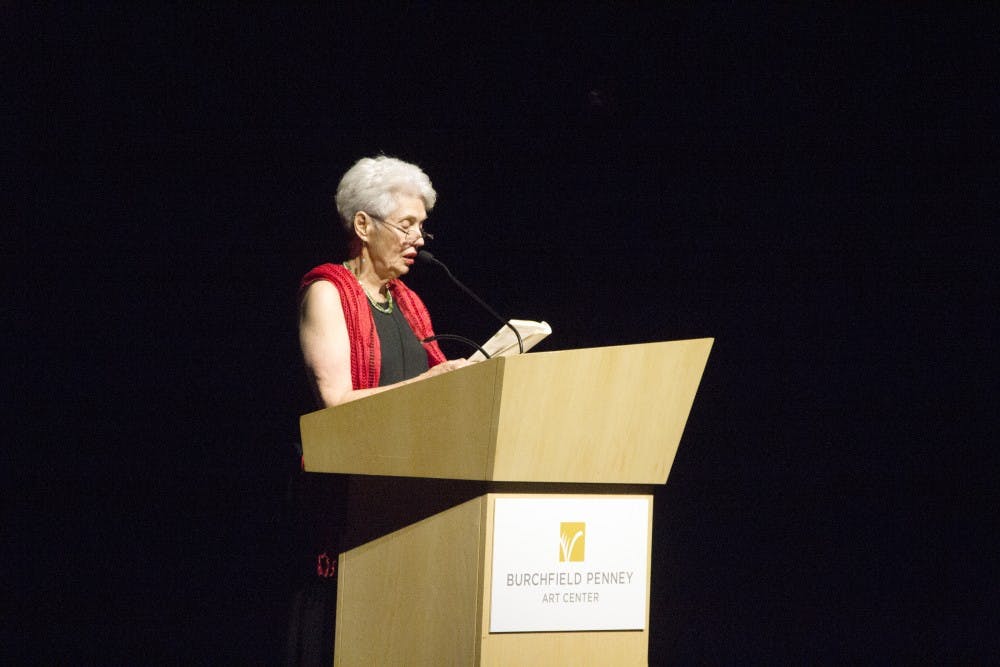From prose poems to musical performances, the second annual R
The series focused on Cuban cinema and culture from Thursday through Saturday, bringing nearly 600 people for nights of screenings and readings. The series was curated by Prof. Tanya Shilina-Conte and presented by efforts from the UB Department of English.
The series aired a number of Cuban-inspired films at the arts center, with some films
Riverrun hoped to provide an expanded cultural vision, according to Shilina Conte.
On Friday evening, the series’ second day opened with films by Sara Gómez and Lynn Hershman-Leeson to a crowd of over 50 attendees.
In “Isla del Tesoro” (Treasure Island), Gómez examines the history of Cuba’s Isla de la Juventud (Isle of Youth) while an intertwining of sound & imagery exhibits the filmmaker’s dynamics.
Throughout the film, images flash of the island’s prison (Presidio Modelo) before its deconstruction as well as its market of fruit distribution. Gómez captures the conversion of the island’s prison into a museum -- the same prison which once housed dissidents from then-Cuban leader Fidel Castro.
Dr. Dalia Antonia Muller -- a
“I think that Sara Gómez, as the first Afro-Cuban female filmmaker, is interesting in the way which her work is not really shown. She wasn’t given that pride and place as a lot of her male contemporaries, for gender reasons or political reasons, because of the nature of her work,” Dr. Muller said.
“So it’s a different kind of dissidence, she was a rich and complex figure in the sense that she came out of the energy of the revolution within its first decade. But not without flaws and she was willing to put this on screen in an intricate way by masking it.”
“Tania Libre” by Hershman-Leeson followed, capturing a conversation between Cuban-born artist Tania Bruguera and psychiatrist Dr. Frank Ochberg. The conversation revolved around the artist’s imprisonment in 2014, her battles with trauma and the gambles she’s taken as an artist in Cuba.
The film highlights some of Bruguera’s performance art, which in some cases have
The film also looks at one of her more popular and interactive works, “Tatlin's Whisper.” The work involved hiring magicians who train doves to sit on participants’ shoulders.
The symbolism displayed in the film draws influence from one of Fidel Castro’s speeches as a Cuban leader when doves landed on his shoulders. Bruguera replicates this imagery hoping that participants could see themselves as leaders.
The conversation between the psychiatrist and Bruguera delivered unique candor to the audience, who wholesomely applauded the film at its conclusion.
Aside from Friday’s opening set of films, installations from artist Alberto Rey like “Waters off of Caibarien” and “An Unkept Promise” were on display. In “An Unkept Promise,” the installation details Rey’s journey home and rediscovery of Cuba, returning to the island 35 years after his exit.
Elsewhere, as the first two films wrapped up on Friday, attendees were invited to indulge in the stylings of Cuban music and cuisine.
In addition to dishes like ropa vieja and arroz con pollo served in the center’s cafe, Wendell Rivera rang in jams on the center’s 2nd floor. Rivera and his collective brought jazziness through their mix of guiros and timbales, inspiring those in attendance to break out in dance on the center’s floor.
Playing numbers like “My Funny Valentine” and “Blue Bossa,” the collective also delivered a twist of a Miles Davis cut which impressed attendees.
Johanan McDowell, a junior media studies major, attended the series hoping to catch rare works of Cuban cinema and walked away impressed by Rivera’s reformed post-bop stylings.
“The music was absolutely incredible and thought there was some real musicality [at play], they do music really differently,” McDowell said.
“For us Americans, we’ll always start our melody on the one but they started their’s on the one, so the groove was still there but at the same time they were doing completely against what’s usually done.”
In the midst of music upstairs, Cuban-born poets Jorge Guitart,
Karman read from a selection of works regarding her collections of Fidel Castro, her understandings of protests in America versus Cuba and her journey back home after 36 years.
As the night’s celebration came to a conclusion, SUNY Distinguished Professor and James Agee Professor of American Culture Bruce Jackson introduced the 1964 film “Soy Cuba” (I am Cuba).
The film, created by Mikhail Kalatozov, features an array of crafty angled shots which capture pre-revolutionary Cuba through the lives of students,
Riverrun dedicated the screening to Yevgeny Yevtushenko, a renowned Soviet/Russian poet who contributed to the propaganda film’s script. Before the film began, Jackson shared pictures taken of Yevtushenko’s visit to Buffalo in 2012.
Jackson thinks “Soy Cuba” is one of the world’s greatest films and the photography is exquisite all around.
“It’s got some shots that rank amongst the best in all of
“It’s a propaganda film, people usually use that term to dismiss something but calling it a propaganda film is like saying something is a western film. Okay, it’s a western - there are good westerns and bad westerns. This is a propaganda film which has all the issues of propaganda film but it [still] ranks among the greatest.”
After the night wrapped up, Saturday’s events preceded with over ten films ranging from shorts to environmental narratives on Cuba. Although the series concluded on Saturday, riverrun is preparing for next year’s installment in Buffalo.
Benjamin Blanchet is the senior arts editor and can be reached at benjamin.blanchet@ubspectrum.com

Benjamin Blanchet is the senior engagement editor for The Spectrum. His words have been seen in The Buffalo News (Gusto) and The Sun newspapers of Western New York. Loves cryptoquip and double-doubles.





